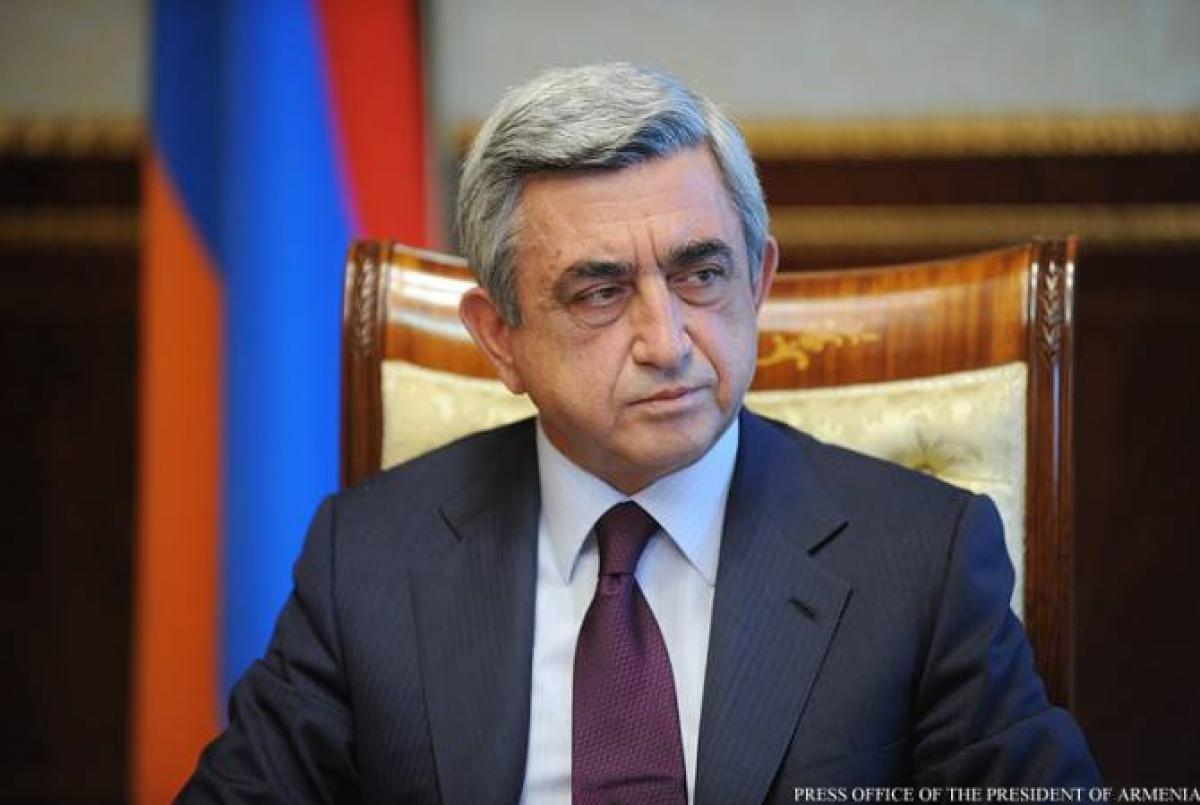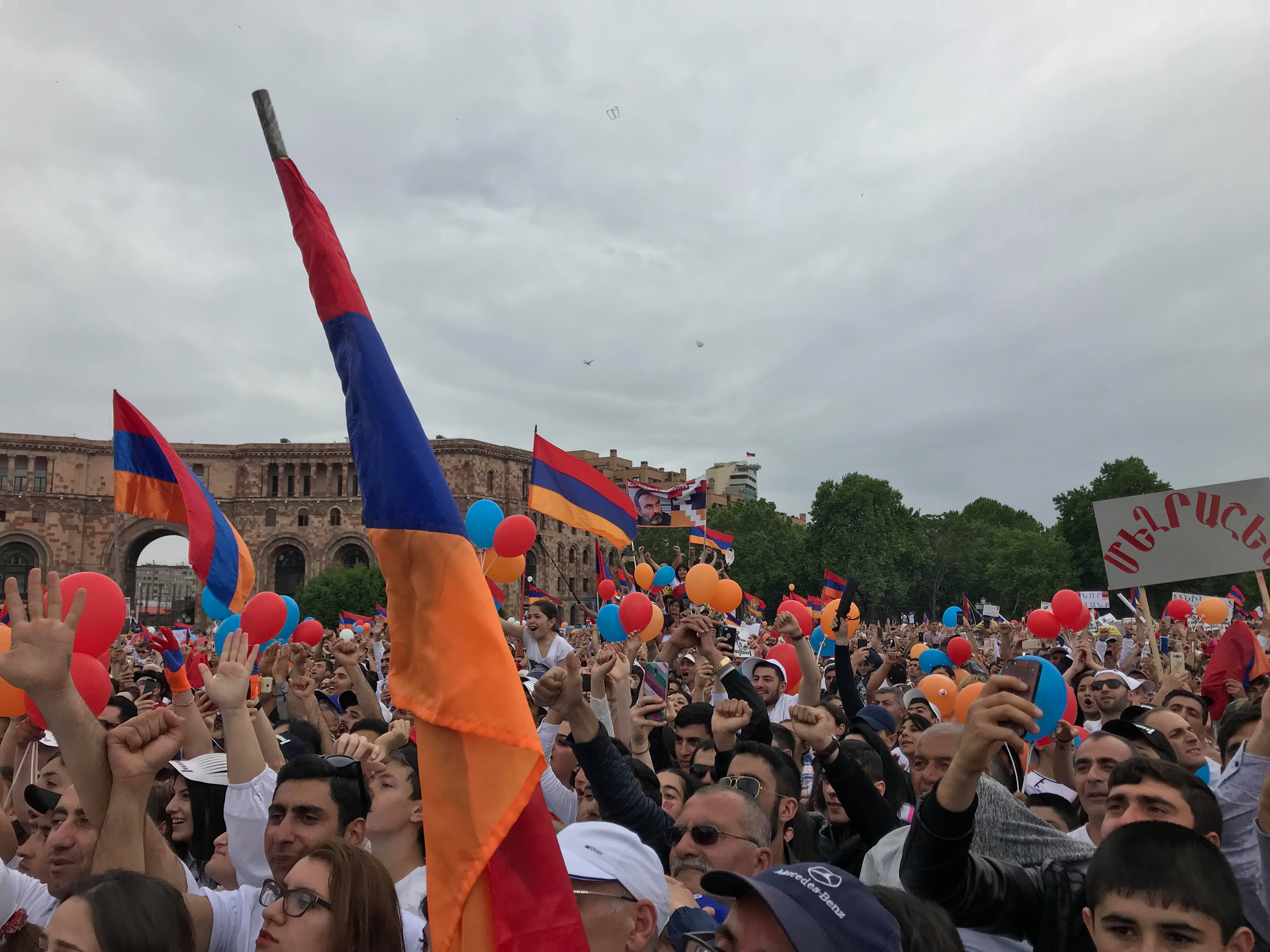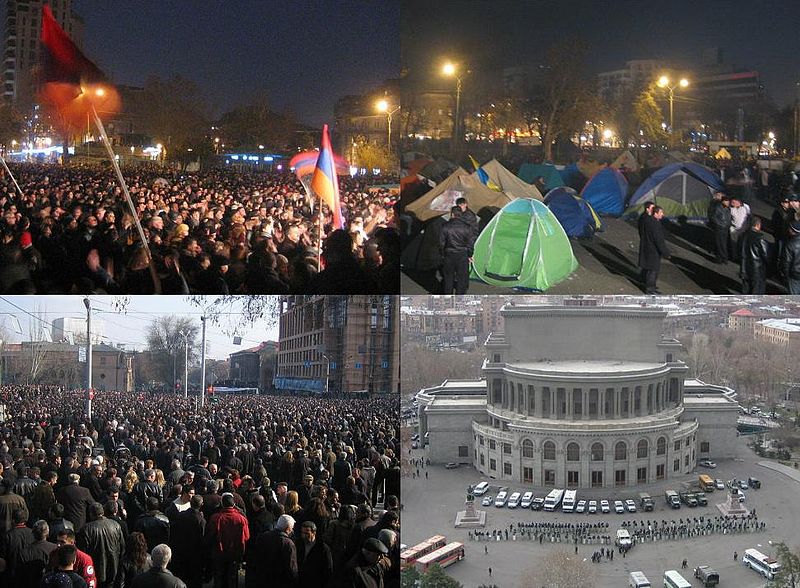

The former President and Prime Minister of Armenia, Serzh Sargsyan, has been charged with embezzling around ֏490 million ($1 million).
On 4 December, Armenia’s Special Investigative Services (SIS) announced that Sargsyan was being charged with ‘the embezzlement of a large amount of state money.’
Popular protests swept Sargsyan from government in the spring of 2018 bringing Nikol Pashinyan to power. Since then supporters of the Velvet Revolution have expressed hopes that former officials would be prosecuted for crimes allegedly committed during the Republican Party’s nearly two decades of rule.

Sargsyan is the latest in a series of high profile figures from the Republican Party to be prosecuted.
If found guilty Sargsyan could face between four to eight years imprisonment. He has been prohibited from leaving the country.
Sargsyan has denied the charges.
The charges against Sargsyan
Based on the lengthy SIS announcement, Sargsyan is accused of embezzling ֏490 million ($1 million) from the Armenian state in 2013. The charges involve a state assistance programme to provide farmers with affordable diesel fuel.
In January 2013, the government issued a tender for 17 million litres of diesel fuel for the programme. Numerous companies bid for the contract, including Maxhur, a fuel importer, and Flash, one of Armenia’s main fuel suppliers. Flash was owned by businessperson Barsegh Beglaryan, who has been accused of having close ties with Sargsyan.
The SIS claims that Sargsyan meddled in the tender process and ensured that Flash won, despite Maxhur offering a lower price.
The Ministry of Agriculture at the time approved of Maxhur’s bid and sent it to the Government for final confirmation. Sargsyan is alleged to have prevented the process from going through and had Flash’s bid confirmed instead, despite the higher prices.
According to the indictment, the Ministry of Agriculture ended up paying over ֏1.7 billion ($3.5 million) to Flash for the fuel — ֏420 million ($880,000) more than Maxhur had offered.
A further contract was signed with Flash later in April of that year, which led to more state funds being used to purchase 17 million litres of diesel fuel. In this case, the excess payment amounted to ֏66 million ($140,000).
Political prosecution
The day the charges were announced, the Republican Party of Armenia (RPA), which Sargsyan still chairs, published an announcement condemning the indictment as political persecution.
The RPA claim that the charges against the former president aim to silence political opposition under the backdrop of dangers threatening Armenia and Nagorno-Karabakh.
They said these ‘steps being taken under the banner of an anti-corruption campaign’ are doomed because the RPA and other political forces will resist them.
They placed full responsibility for the process on the shoulders of a ‘populist and authoritarian regime which has usurped the Armenian state’. They also vowed to raise the issue in international platforms.
During an interview with Tert.am on the evening of 4 December, one of Sargsyan’s lawyers, Amram Misakyan, stated that Sargsyan was originally called in for questioning as a witness. He said Sargsyan was informed he was being charged during the questioning.
Misakyan claimed that Sargsyan has political immunity from prosecution. ‘The decision to indict Sargsyan was not made in the SIS building. It’s political persecution’, he said, adding they would appeal the decision to the Prosecutor General ‘very soon’.
When questioned about rumours that Sergo Karapetyan, who served as Agricultural Minister from 2010-2016, had given evidence against Sargsyan to save himself from future indictments, Misakyan stated he legally could not comment on this.
Former parliamentary MP and RPA member Margarit Yesayan told ArmDaily that she believes the charges have a political subtext and are connected with a meeting between the foreign ministers of Armenia and Azerbaijan in Bratislava on the same day the charges were announced.
She claimed that developments around the Nagorno-Karabakh conflict had accelerated and these charges aim to divert people’s attention so that the Armenian authorities can continue to ‘carry out their dark work.’
‘Indictments again Sargsyan were just a matter of time’, Yesayan said. ‘I was confident it was going to take place exactly when suspicious deals were going to take place around Nagorno-Karabakh.’
Yesayan claimed the charges were also connected to Sargsyan’s comments in Zagreb during the European People’s Party (EPP) Congress on 21 November.
‘He stated that Nagorno-Karabakh has not been and never will be part of Azerbaijan’, she concluded.
After almost a year and a half of public silence, Sargsyan took part in the EPP Congress in late November during which he harshly criticised the current Armenian government.
He also mentioned the Nagorno-Karabakh conflict. ‘As someone who participated in the liberation of Artsakh [Nagorno-Karabakh] in person, I am well aware of the price for peace’, Sargsyan stated.
‘From this perspective, any negotiation, however inadequate, is more preferable than war’, he said. ‘Unfortunately, we are witnessing Azerbaijan continue to arm itself and threaten Artsakh and Armenia. I want to reiterate this message of mine for those in Baku to hear: Artsakh will never be a constituent of Azerbaijan, and the issue has no military solution.’
During a Q&A session between the Government and parliament the day the charges were brought, Prime Minister Pashinyan was asked about the indictment.
‘When we read about the case, [Deputy Prime Minister] Avinyan and I remembered that our Government shut down this state assistance programme for diesel fuel because we considered it a corrupt programme’, Pashinyan said.
‘The investigation will get to the bottom of this. I can’t state more than what has been officially announced.’
Emil Sanamyan, a Washington-based analyst and a fellow at USC’s Institute of Armenian Studies, told OC Media that Sargsyan’s prosecution could be seen as a political process.
‘In Armenia, as in most countries, any time charges are brought against current or former government officials this is done based on political calculations of a chief executive, in this case, prime minister Pashinyan’, Sanamyan said.
‘Also considering the specific charges are fairly exotic — diesel supply for agriculture subsidies — are not exactly foremost in people’s minds when it comes to Sargsyan’s presidency. I think the charges were prepared in a hurry in the last couple of weeks.’
Sanamyan also shares the belief that the indictment is connected to Sargsyan’s speech in Zagreb. ‘This way they can bar him from travelling abroad, which is what he did quite often in the last year and a half’, Sanamyan said.
However, he doesn’t see a connection to the Nagorno-Karabakh conflict. ‘The RPA’s notions that Pashinyan wants to cut some sort of a deal with Aliyev are unfounded and are typical of speculations that Armenian opposition parties have engaged in the past 30 years,’ he explains.
Prosecutions of former officials
The case against Sargsyan is one of many ongoing prosecutions of former officials.
Soon after snap parliamentary elections in December 2018 gave Pashinyan an overwhelming majority, former President Robert Kocharyan, Sargsyan’s predecessor, was arrested.
He was charged with overthrowing constitutional order for his role in the violent crackdown of anti-government protestors on 1 March 2008, which left 10 people dead. His trial is ongoing.

In July 2018, charges were brought against Yuri Khatchaturov, then Secretary-General of the Russian-led Collective Security Treaty Organisation (CSTO), as part of the same case.
Also in July, Serzh Sargsyan’s nephew, Narek Sargsyan, was indicted for kidnapping and assault. He was arrested in Prague in December 2018 in possession of a fake Guatemalan passport.
In June, Serzh Sargsyan’s brother, Alexandr Sargsyan (Narek’s father) was arrested. He was released on bail in November 2018 after he agreed to ‘donate’ $30 million — which Nikol Pashinyan accused him of having accrued illegally — to the state coffers.









